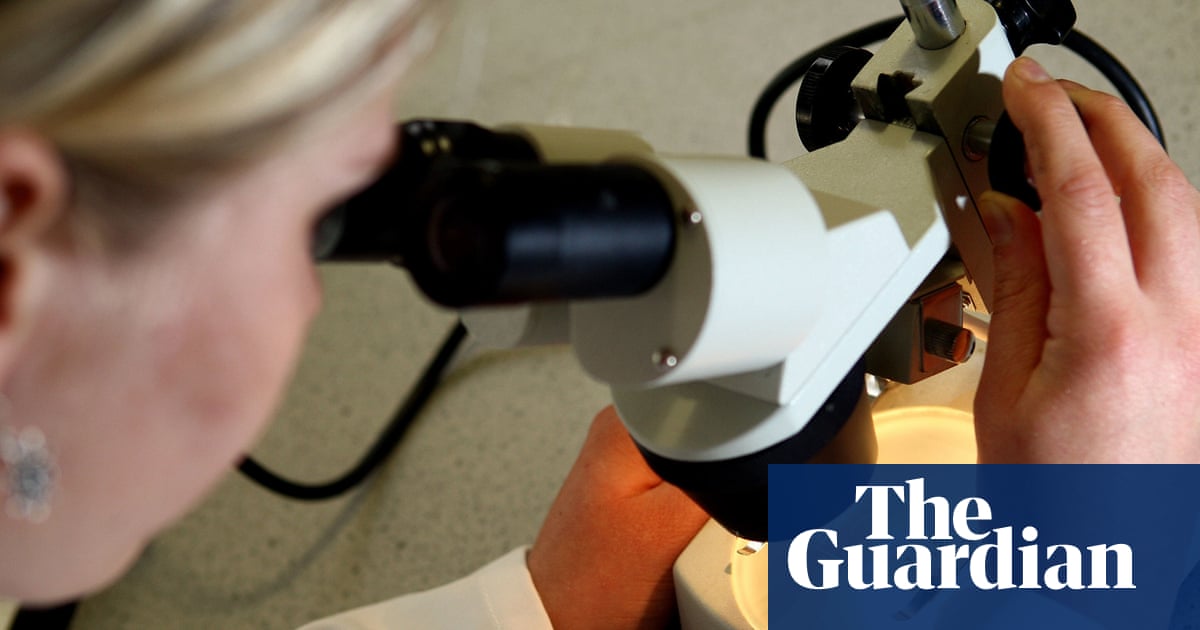Sir John Bell, a prominent scientist who brought business and government together during the Covid-19 vaccine rollout, has warned that other big pharmaceutical companies will stop investing in the UK, after Merck’s decision to scrap its planned £1bn London research centre.
Bell, a former regius professor of medicine at the University of Oxford, told Today on BBC Radio 4 that he had spoken to several chief executives of large companies in the past six months “and they’re all in the same space, and that is, they’re not going to do any more investing in the UK”.
He made the comments a day after Merck, known as MSD in Europe, said it would pull out of research & development (R&D) in the UK with the loss of 125 science jobs, citing the UK’s lack of progress on life science investment and the “overall undervaluation of innovative medicines and vaccines by successive UK governments”.
Prof Sir John Bell, immunologist and geneticist. Pictured in 2022. Photograph: Sophia Evans/The Observer
The Canadian immunologist, who was an early member of the government’s vaccine taskforce and previously worked on Oxford university’s Covid vaccine with AstraZeneca, said: “This is a sign of something which has been evolving over a little while, but it’s going to now, I think, lead to a whole series of events which will mean that the industry is going to stop investing in the UK.”
He said the pharma industry “is in real trouble in terms of pricing, particularly in America”, where Donald Trump has put pressure on companies to lower prices, and not to sell medications at a much lower price elsewhere.
A big issue is the amount of money the NHS spends on medicines, he said.
“Ten years ago, we used to spend 15% of our healthcare spend on pharmaceuticals. Now it’s 9%. The rest of the world, the OECD, are sitting between 14% and 20%,” Bell said.
Long-running negotiations between the UK government and drugmakers over the cost of medicines broke down last month.
Under the voluntary pricing and access scheme, companies agree to pay back to the NHS a certain amount of their UK revenue made from branded drugs. They are now paying back between one-quarter and one-third of their UK revenue (23.5% to 35.6%), compared with rebate rates of 5.7% in France and 7% in Germany, according to the Association of the British Pharmaceutical Industry.
Bell said that Britain had “great science in academia”, and “great biotech companies” and infrastructure funded by government, “but without large companies, it isn’t going to work”.
skip past newsletter promotion
Sign up to Business Today
Get set for the working day – we’ll point you to all the business news and analysis you need every morning
Privacy Notice: Newsletters may contain information about charities, online ads, and content funded by outside parties. If you do not have an account, we will create a guest account for you on theguardian.com to send you this newsletter. You can complete full registration at any time. For more information about how we use your data see our Privacy Policy. We use Google reCaptcha to protect our website and the Google Privacy Policy and Terms of Service apply.
after newsletter promotion
He added: “The large companies do have to work in a system where they can sell their products, and if they can’t sell their products here, they’ll go and do their business somewhere else.”
He said the UK had been in this situation before, and “solved [the problems] by being a bit more creative for what we did”. He referred to the cancer drugs fund, introduced in 2011 by then prime minister David Cameron. The UK had fallen behind on cancer medicines, and the fund enabled it to buy innovative, more expensive drugs.
Bell has just stood down as president of the Ellison Institute of Technology, founded by the US billionaire Larry Ellison, who briefly overtook Elon Musk as the world’s richest man on Wednesday. At the start of this month, the institute launched a new AI vaccine research programme with Oxford.

